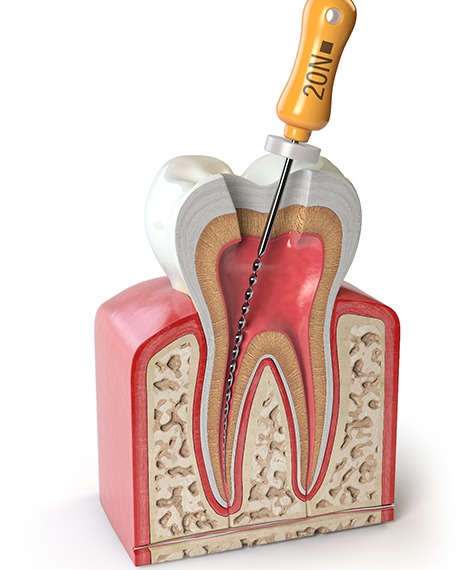Root Canal Treatment – Henderson, NV
Stopping the Pain in Your Tooth
What does it mean if your tooth is in constant pain? In many cases, it could be a warning sign of a serious infection. Fortunately, Dr. Noorda can help you find relief from your discomfort – and save your tooth in the process – with a root canal treatment. And thanks to modern dental advancements and techniques, this procedure is nowhere near as frightening as many people believe. Reach out today if you think you may be in need of a root canal.
Why Choose Dental Excellence: Dr. Brett Noorda for Root Canal Treatment?
- Relaxing Sedation Dentistry
- State-of-the-Art Technology
- Wide Range of Dental Insurance Plans Accepted
Do I Need Root Canal Treatment?

-Krystin S. recommends Dental Excellence: Dr. Brett Noorda.
Dr. Noorda is an excellent dentist. I have been avoiding the dentist for over 8 years due to a prior dental experience. Dr. Noorda and his staff make your experience calming, reassuring and has a homely atmosphere. I had 2 root canals, 1 filling and a deep cleaning all in 3 hours, but due to IV and oral sedation, it didn't phase me one bit. I highly recommend Dr. Noorda and his staff. Wonderful!! A++++
A root canal treatment is required if the pulp inside a given tooth has become infected. A severe toothache that won’t go away is often a strong indicator that you have a tooth infection. There are also a number of other warning signs you can look out for, such as:
- Feeling a sharp pain when you bite or chew.
- Experiencing severe sensitivity whenever something hot or cold touches your tooth.
- Gum tissue around the tooth in question becoming red or swollen.
- The affected tooth becoming discolored.
- A bump resembling a pimple appearing on the gums.
As soon as you notice any of the symptoms listed above, you should give our office a call. Time is of the essence; you will want to have the issue diagnosed as soon as possible so that you can get the treatment that you need.
The Root Canal Process

First of all, it’s important to note that root canal treatment is actually nowhere near as painful as its reputation suggests. Our team will always begin the procedure by administering a local anesthetic. This helps ensure that your mouth stays numb during the process; you might feel some pressure, but there will be little to no discomfort.
In order to perform a root canal, we will need to create a small opening in your tooth. This allows us to take out the damaged or infected pulp before any further harm can be done. The next step is to sanitize the inside of your tooth; we need to make sure that there are no bacteria left behind. Once the cleaning is done, a biocompatible material called gutta-percha will be used to help the treated tooth maintain its shape.
At the end of your root canal treatment, a temporary crown will be placed on the tooth. A permanent crown will be placed at a later appointment. This step is important for ensuring that you are still able to use the tooth in question normally.
The Benefits of Getting a Root Canal

When a root canal treatment is recommended, it is best to have the procedure performed as soon as possible. Doing so will allow you to enjoy the following benefits:
- You will be able to avoid more severe health issues that might have occurred if the infection was allowed to spread.
- You will be able to save the affected tooth, thus allowing you to keep your natural smile intact.
- You won’t have to live with discomfort in your tooth anymore.
Root Canal FAQs
How Much Pain is Normal After a Root Canal?
Thanks to the numbing agent we use, you won’t feel any pain or discomfort during the root canal procedure. Once that wears off, however, you may begin to experience some soreness. Usually, this subsides around the three-day mark, and there are several things you can do to stay comfortable. That includes sticking to soft foods, rinsing with warm saltwater periodically, and taking OTC pain medication as directed.
Note: If your symptoms seem to be getting worse instead of better, don’t hesitate to give us a call, especially if you think an infection has developed.
Can I Eat Before a Root Canal?
That depends largely on whether sedation dentistry is a part of your treatment plan or not. If it is, then we may ask that you stick to water the morning of your procedure. If it isn’t, then you should be okay to eat a meal or snack prior to your arrival at our office (ideally something that’s well-balanced and low in added sugar).
Can Root Canals Be Prevented?
Yes, root canals can typically be prevented! That’s one of the many reasons we encourage our patients to commit to a solid at-home oral hygiene regimen, including flossing and rinsing with mouthwash consistently. It’s also important to adopt other healthy habits, including wearing a mouthguard when playing sports, coming in for a checkup and cleaning twice a year, and keeping your consumption of added sugar to a minimum.
Tip: If you seem to be prone to oral health problems like tooth decay, don’t hesitate to ask our team for tips on how to improve your at-home oral hygiene regimen!
What Happens if You Wait Too Long for a Root Canal?
If you decide to take the “wait and see” approach, you’ll be disappointed. That’s because dental damage of this caliber cannot heal on its own. In fact, it will worsen over time, and may even progress to the point where saving your tooth is no longer an option. That’s why we strongly recommend getting the restorative care you need when we first recommend it!
Note: If your once painful toothache goes radio silent, it’s likely because the infection has “killed” the nerve of your tooth. So, coming in for root canal treatment is still a priority!
Can I Take Antibiotics Instead of Getting a Root Canal?
No, antibiotics are not an adequate alternative to root canal treatment. That’s because this infection-fighting medication travels through your bloodstream, which cannot reach the pulp of your tooth. As a result, the only way to restore the look, health, and function of your smile is to come in for the necessary care.
